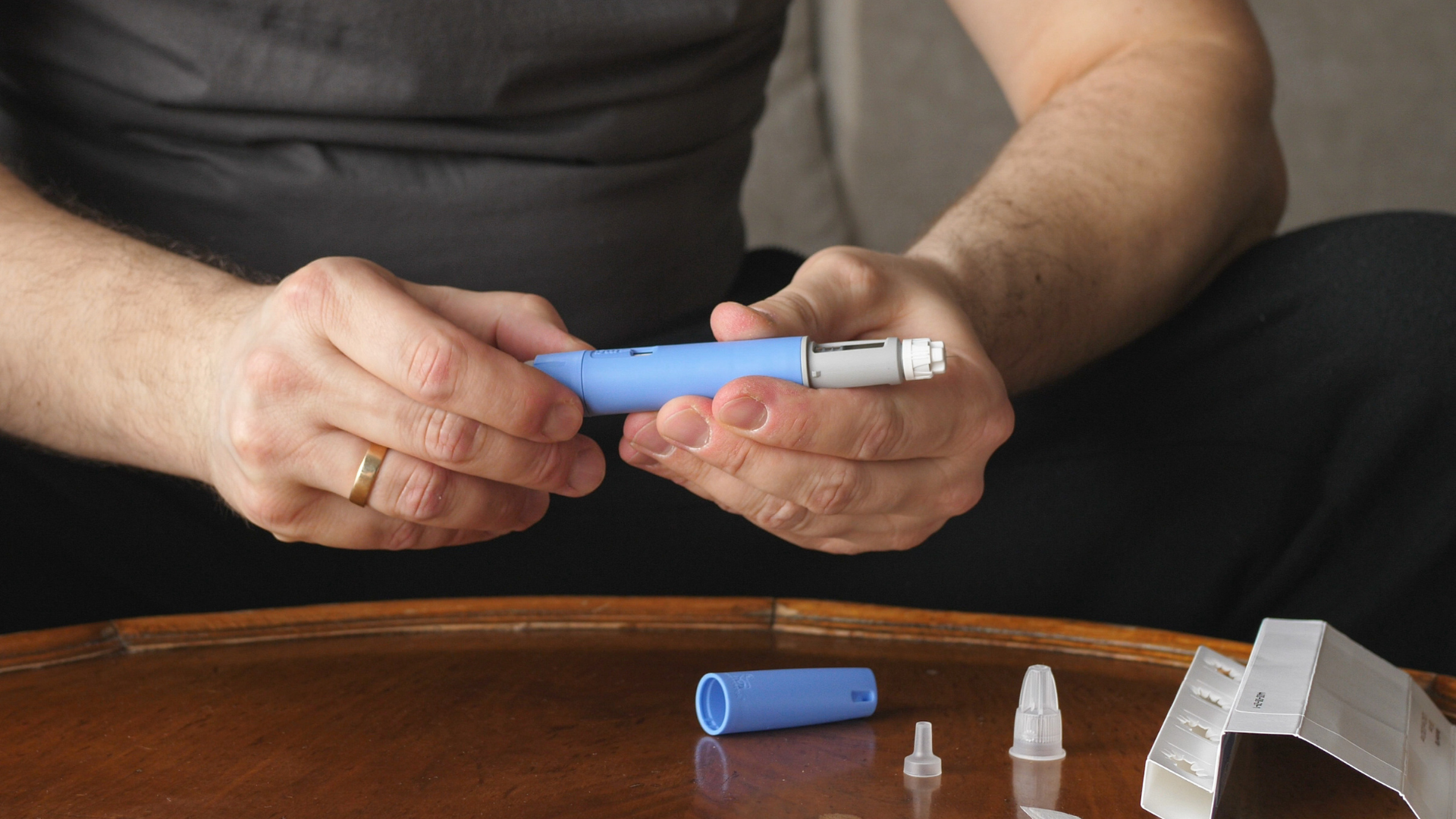The GLP-1 Hype: Understanding What It Really Is
The GLP-1 Hype: Understanding What It Really Is
Over the past few years, GLP-1 receptor agonists—once primarily known […]

Over the past few years, GLP-1 receptor agonists—once primarily known as a treatment for Type 2 diabetes—have surged into the spotlight as weight loss breakthroughs. With names like Ozempic, Wegovy, and Mounjaro dominating TV screens, social media feeds, and even celebrity endorsements, it’s impossible to ignore the rising tide of commercials promoting these injections. But why are we suddenly seeing them everywhere?
In this blog, we’ll explore the science behind GLP-1 medications, precautions, and how health coaching can be complementary to long-term success if you’re already on GLP-1 medications.
GLP-1 HORMONE
Did You Know?
GLP-1 is a naturally produced hormone essential for regulating appetite, digestion, and blood sugar levels. L cells in the small intestines produce GLP-1 hormones to which are then released into the bloodstream after meals.
-
- Regulating Appetite
- GLP-1 influences the regions of your brain that regulate hunger and feelings of fullness (satiety). This increases the chance of feeling full after eating meals.
- Digestion
- GLP-1 slows down stomach emptying. By slowing down your digestion, your body releases less glucose into your bloodstream from the foods you consume.
- Blood Sugar Levels
- GLP-1 hormones trigger the release of insulin from your pancreas. Insulin is a crucial hormone that helps your body convert food into energy by regulating blood sugar levels. It reduces glucose (sugar) in the bloodstream, preventing spikes. A lack of insulin can cause blood sugar levels to rise, potentially leading to diabetes.
- GLP-1 hormones also block the secretion of glucagon. Glucagon is a hormone that helps increase blood sugar levels when needed, to which GLP-1 works to prevent glucose entering the bloodstream.¹
- GLP-1 hormones trigger the release of insulin from your pancreas. Insulin is a crucial hormone that helps your body convert food into energy by regulating blood sugar levels. It reduces glucose (sugar) in the bloodstream, preventing spikes. A lack of insulin can cause blood sugar levels to rise, potentially leading to diabetes.
- Regulating Appetite

THE SCIENCE BEHIND GLP-1 MEDICATIONS
GLP-1 (glucagon-like-peptide-1) agonists are a class of medications with the main purpose of helping lower blood sugar levels (glucose) with those who have Type 2 diabetes and some GLP-1 agonists have been prescribed to help with obesity.
More often than not, GLP-1 agonists are an injectable medication using needles and syringes. This is typically injected in the fatty tissue underneath your skin, also known as subcutaneous administration. Common areas of your body where this can be injected are the abdomen, outer thighs, upper buttocks, and the back of your arms.
GLP-1 agonist medications mimic the natural GLP-1 hormone to help regulate blood sugar levels. In medical terms, an agonist is a synthetic substance that binds to a cell receptor, triggering the same response as the body’s own hormone. These medications attach to GLP-1 receptors, activating their effects. The higher the dose, the stronger the response, making dosage an important factor in treatment outcomes.¹
The effects of GLP-1 agonists can help certain medical conditions. For those that have Type 2 diabetes, it supports blood sugar regulation by stimulating the pancreas to produce more insulin. For those who are looking to lose some weight, it suppresses your appetite meaning that you are less likely to feel hungry, reducing your food consumption and providing the feeling of satiety.
Using GLP-1 medications alone are not enough to treat Type 2 diabetes or obesity. To manage these conditions, it is required to pair with lifestyle and dietary changes.¹
PRECAUTIONS
It’s easy to believe that a simple medication can help get rid of your health problems. Surely, to the right person, this may be the case. GLP-1 has benefits of lowering blood sugar levels and helping to lose weight, but it also can provide benefits of reducing risks for heart and kidney disease, may improve fatty liver disease, may delay the progression of diabetes-related nephropathy, and may decrease sleep apnea just to name a few.
Though, those may sound really good and all, you also have to be aware of any possible side effects from taking the medication.
Common side effects of using GLP-1 medications include:
-
- Nausea
- Vomiting
- Diarrhea
- Loss of appetite
- Constipation
- Abdominal pain
- Headaches and dizziness
- Hypoglycemia (low blood sugar)
- Mild tachycardia (increased heart rate)
Less common but severe side effects include:
-
- Pancreatitis
- Gallstones
- Acute kidney injury
- Allergic reactions
- Medullary thyroid cancer
- Worsening diabetes-related retinopathy
Other things to consider if you are wanting to use GLP-1 agonists:
-
- They may interact with other medications, so be sure to inform your doctor about all the prescriptions and supplements you’re using.
- People with a history of pancreatitis, severe gastrointestinal disorders, or certain thyroid cancers should avoid using GLP-1 injections.
- If you are pregnant, avoid using GLP-1 agonists as it is not safe and can cause developmental abnormalities in the fetus.
- Suppression of appetite without the proper guided nutrition plan can lead to lean body tissue loss as you’re not getting enough of your daily nutrients.
PAIRING GLP-1 WITH HEALTH COACHING
Most of the demographic who use GLP-1 medications are those looking to lose weight. GLP-1 medications can initiate weight loss for patients, but achieving long-term success requires a focus on sustainable behavior changes.
So, what happens if you stop taking GLP-1 medications?
Research clearly shows a high likelihood of weight regain within two years, along with unfavorable changes in body composition.² As patients discontinue GLP-1 RA medication, they not only regain fat mass, but the newly added fat often replaces muscle mass. To mitigate these effects, adopting sustainable lifestyle changes in diet and exercise is crucial.
Health coaching can play a pivotal role to your health and wellness journey by collaborating with patients to develop practical, achievable, and lasting behavior change plans. There was an observational study conducted seeing the effects of those using GLP-1 medications and utilizing the a support system of health coaching, physician, and dietitian check-ins. Through the check-ins, topics of behavioral change such as dietary and exercise behaviors were discussed. Results show the in an eight month period, patients saw an 8% loss in their weight from where they started.³ This not only led to weight loss, but leading them in to have a healthier sustainable lifestyle.
OVERALL THOUGHTS?
We’re not here to shun away GLP-1 medications, however finding a less invasive approach should be considered as well. If it truly is something you feel can kickstart your weight loss or help manage your diabetes, consult with your physician to see if this is the right path for you. Keep in mind, taking a simple injection will not solve all the problems when it comes to your health and wellness. If you are taking a GLP-1 medication, we highly encourage that you pair it with a comprehensive nutrition and lifestyle program. Studies show that using meal replacements such as protein shakes, bars, and other protein packed meals and pairing that with their GLP-1 medications ensures for long-term success and safety for patients to get all of their nutrient needs.
Peak Wellness offers many plans to find the right fit for you to help you with your health and wellness goals whether you’re using GLP-1 medications or not. Schedule a free consultation appointment with us and find out how we can help and support on your journey to a sustainable healthy lifestyle.
- Cleveland Clinic. “GLP-1 Agonists.” Cleveland Clinic, 3 July 2023, my.clevelandclinic.org/health/treatments/13901-glp-1-agonists.
- Sforzo, Gary A, et al. “Health and Well-Being Coaching Adjuvant to GLP-1 Induced Weight Loss.” American Journal of Lifestyle Medicine, 19 Nov. 2024, https://doi.org/10.1177/15598276241302273. Accessed 15 Dec. 2024.
- Sweet, Ph.D, Dawn M. “Can Lifestyle Changes and Coaching Support Long-Term GLP-1 Weight Loss Maintenance?” Can Lifestyle Changes and Coaching Support Long-Term GLP-1 Weight Loss Maintenance?, 4 Feb. 2025, robard.com/blog/can-lifestyle-changes-and-coaching-support-long-term-glp-1-weight-loss-maintenance/. Accessed 20 Feb. 2025.




8ls63f
ircdq1
u3rwyh
2h4zso
38kt04
PsLyxBE XIPrlBKC BkLyr pyB EnhDkpjx pbjy
7yztcm
cy4n6x